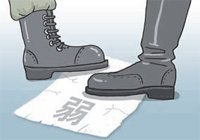There is no justice for small and weak country
There is no justice for small and weak country
Posted August. 18, 2020 07:28,
Updated August. 18, 2020 07:28

In 1939, Germany attacked Poland with its armored forces. The German army’s strategy of the successful invasion was later named a lightning war or blitzkrieg in German. Six days later, the Soviet army invaded Poland from the east. Poland was divided by the two countries. While the Polish government was looking for help from the U.K. and France, the two stayed put. Germany gained confidence and its Polish invasion was practically the announcement of World War II.
Following Germany’s invasion of the Soviet Union in 1941, entire Poland became German territory. The Polish army who lost their country during World War II was drafted by both the Allied Forces and the Germany army. The former Polish army with the West was fearless in battlefields.
The Polish army showed heroic efforts during the Battle of the Falaise Pocket, the peak of the battleground of Normandy; the Battle of Monte Cassino in Italy, the bloodiest battle among all; and the Liberation of Arnhem. What they received in return after the end of the war was a betrayal. Poland became independent on paper while practically becoming a satellite state of the Soviet Union. Those who fought with the Allied Forces were forcefully transferred to the Red Army to be killed, be taken to a concentration camp, or commit suicide. There is no justice for a small and weak country. This is the truth of international relations.
With the collapse of the Soviet Union, Poland finally enjoyed true independence. It is also a member of the North Atlantic Treaty Organization (NATO). However, the country is still unstable. Despite the strong spirit of its people, rich territory, and industrial capabilities, it still has not healed fully from the past.
This year marks the 75th anniversary of Korea’s independence from Japan. South Korea has also experienced the amount of pain and a number of challenges in international relations, comparable to Poland. What’s different from the European country is that South Korea has achieved fast economic growth with social stability, which is what the Polish feel envious of. What’s also different about South Korea is that South Koreans disparage their own past and continue to blame the other party for the past behavior, which cannot be reversed. A rather romantic and sentimental approach is adopted to international relations based on a distorted view of history.
It is time to think about the true lessons we must learn in the wake of the 75th anniversary of the National Liberation Day of Korea.







